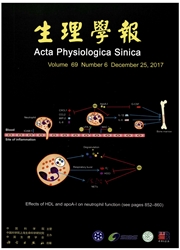

 中文摘要:
中文摘要:
机体内儿茶酚胺(catecholamines,CAs)包括去甲肾上腺素(norepinephrine,NE)、肾上腺素(epinephrine,E)和多巴胺(dopamine,DA)。CAs由神经元和内分泌细胞合成和分泌,其主要功能是调节心血管、呼吸和消化等内脏活动。近三十年来的研究说明,CAs也参与调控机体的免疫功能,但CAs的这种免疫调节作用一般视为神经和内分泌系统调节的介导作用。然而,近年来的研究发现,免疫细胞也能合成CAs,这是对传统观念的一种补充和提高。免疫细胞内存在经典的CAs代谢途径,既有合成CAs的酪氨酸羟化酶(tyrosine hydroxylase,TH)又有降解CAs的单胺氧化酶(monoamine oxidase,MAO)和儿茶酚氧位甲基移位酶(catechol-O-methyl transferase,COMT)。免疫细胞合成的内源性CAs可以调控细胞的增殖、分化、凋亡和细胞因子生成等多种免疫功能。CAs的这些作用可能主要通过自分泌或旁分泌途径作用于免疫细胞上相应受体和细胞内环磷酸腺苷(cyclicAMP,cAMP)实现。细胞内氧化应激机制可能也参与免疫细胞内源性CAs的免疫调节作用。此外,一些自身免疫性疾病如多发性硬化、风湿性关节炎可能也与免疫细胞内CAs的代谢异常有关。上述发现不仅为免疫系统有可能成为除神经和内分泌系统以外的第三个CA能系统提供了证据,而且为免疫系统内源性CAs的功能意义拓展了认识。
 英文摘要:
英文摘要:
It has been well known that catecholamines (CAs) in the body, including norepinephrine (NE), epinephrine (E) and dopamine (DA), are synthesized and secreted by neurons and endocrine cells and mainly modulate visceral activities such as cardiovascular, respiratory and digestive functions. The studies over the past nearly 30 years have shown that CAs can also regulate immune function. The immunomodulation of CAs is generally considered as a role mediating the regulation of nervous and endocrine systems. However, recent studies reveal that immune cells can also synthesize CAs, which is an update of traditional concept. A classical metabolic pathway of CAs shared by the nervous and endocrine systems is present in the immune cells, i.e., the immunocytes have the enzymes for synthesis of CAs [e.g. tyrosine hydroxylase (TH)] and the enzymes for degradation of CAs [e.g. monoamine oxidase (MAO) and catechol-O-methyl transferase (COMT)]. The endogenous CAs synthesized by immune cells can regulate many immune functions, including cellular proliferation, differentiation, apoptosis and cytokine production. These roles of the endogenous CAs may be mediated by an autocrine/paracrine pathway via relevant receptors on the immunocytes and intracellular cAMP. Intracellular oxidative mechanism may also be involved in immunoregulation of endogenous CAs in immune cells. In addition, some metabolic abnormalities of CAs in the immune cells probably induce some autoimmune diseases, such as multiple sclerosis (MS) and rheumatoid arthritis. These findings not only provide evidence for the new concept that the immune system is possible to become the third CA system other than the nervous and endocrine systems, but also extend our comprehension on functional significance of the endogenous CAs synthesized by immune cells.
 同期刊论文项目
同期刊论文项目
 同项目期刊论文
同项目期刊论文
 期刊信息
期刊信息
